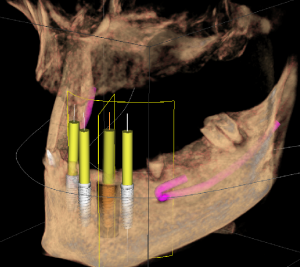Dental Implants are not Painful

Dental implants are often associated with minimal discomfort and pain due to advancements in dental technology and surgical techniques especially at our life smile center. The procedure is typically performed under local anesthesia, ensuring that patients feel no pain during the surgery itself. Postoperative discomfort is generally manageable with over-the-counter pain medications, and many patients report only mild soreness or swelling for a few days following the procedure. Additionally, the healing process is relatively smooth, with the implant gradually integrating into the jawbone without causing significant pain. Overall, dental implants have become a well-tolerated and relatively pain-free solution for replacing missing teeth, providing patients with a comfortable and natural-looking smile.
Are dental implants safe?
Dental implants are considered a safe and highly reliable option for replacing missing teeth. They are made from biocompatible materials, typically titanium, which integrates seamlessly with the jawbone through a process called osseointegration. This strong bond ensures stability and durability, allowing patients to enjoy natural-looking and functional teeth for many years. Moreover, dental implant procedures are performed by trained professionals who prioritize patient safety and follow strict sterilization and hygiene protocols, minimizing the risk of infection or complications. As a result, dental implants have a proven track record of safety, providing patients with a comfortable and secure solution to restore their smiles and oral health. At Dental Plus Tarzana we always use the latest CT scan technology to find the ideal placement for your dental implant.
Are dental implants covered by medicare?
In general, Medicare does not typically cover dental implants. Medicare primarily provides coverage for medical services and treatments, while dental care, including procedures like dental implants, falls under separate dental insurance plans or is often paid for out-of-pocket by the patient. It's important for individuals seeking dental implant coverage to explore private dental insurance options or consider dental discount plans to help with the associated costs.
Are dental implants worth it?
Dental implants are often considered worth it for individuals seeking a permanent solution to replace missing teeth. They offer numerous benefits, including improved aesthetics, restored functionality for eating and speaking, and enhanced oral health by preventing bone loss. While they can be more expensive and require a surgical procedure compared to other options like dentures or bridges, their longevity and natural look and feel make them a valuable investment for many people seeking a long-term solution to tooth loss. Ultimately, the decision should be based on an individual's specific needs and circumstances, with consultation with Dr Rennaker to determine the best treatment plan.
Are dental implants permanent?
Dental implants are considered a long-term and potentially permanent solution for replacing missing teeth. While they are not necessarily guaranteed to last a lifetime, they are designed to be a durable and reliable option with proper care and maintenance.
The longevity of a dental implant depends on several factors, including:
- Oral hygiene: Maintaining good oral hygiene is crucial for the long-term success of dental implants. Proper brushing, flossing, and regular dental check-ups are essential to prevent gum disease and implant-related complications.
- Bone density and quality: The density and quality of the bone in the jaw where the implant is placed play a significant role in the success of the implant. Adequate bone support is necessary to anchor the implant securely.
- Implant materials and design: High-quality implant materials and well-designed implant systems contribute to the longevity of dental implants. Titanium is commonly used because it has excellent biocompatibility and can fuse with the bone in a process called osseointegration.
- Surgeon's skill and experience: The success of the implant procedure is also influenced by the skill and experience of the oral surgeon or implantologist who places the implant.
- Lifestyle factors: Habits such as smoking and excessive alcohol consumption can increase the risk of implant failure. It's important to avoid these habits for the best possible outcome.
- General health: Certain medical conditions and medications can affect the success of dental implants. Your overall health and any medical conditions you have should be considered when planning for dental implant placement.
While dental implants can last for many years, they may require occasional maintenance or replacement due to wear and tear, changes in the surrounding bone and gum tissue, or other factors. Routine dental check-ups and follow-up appointments with your implant dentist are essential for monitoring the health and stability of your dental implants.
In summary, dental implants are designed to be a long-lasting and potentially permanent solution for replacing missing teeth, but their longevity depends on various factors, including your oral hygiene, bone health, and overall health. With proper care and maintenance, dental implants can provide a stable and functional restoration for many years.
About Dental Plus Tarzana
WHERE TO FIND US
Dental Plus Tarzana Business Hours
Mon - Thur 9am - 5pm
Fri - Sat By Appointment only
Sunday Closed
CONTACT
818-881-2333
dentalplustarzana@gmail.com
CROWNS IN A DAY IN TARZANA
DENTAL IMPLANTS IN TARZANA
TEETH WHITENING IN TARZANA
DENTAL ORTHODONTICS IN TARZANA
DENTAL MAINTENANCE IN TARZANA
CLEANING AND HYGIENE IN TARZANA
HIGH TECH DENTAL EXAMS IN TARZANA
DENTAL RESTORATIONS IN TARZANA
DENTAL FILLINGS IN TARZANA
DENTAL EXTRACTIONS IN TARZANA
Dental Plus Tarzana © 2023
Thomas P. Rennaker, DDS, Inc.
This website does not share any information with any third parties.
